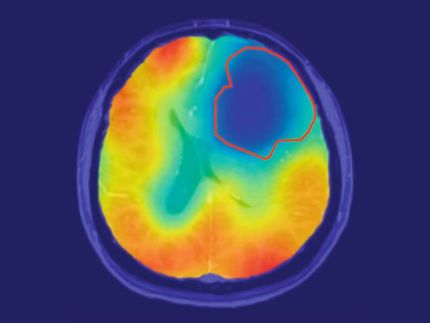New angle to combat malignant brain tumors in children
A Medulloblastoma is a malignant brain tumor that occurs primarily in children and is currently untreatable. Peter Carmeliet and his team (VIB-KU Leuven) joined forces with scientists at Massachusetts General Hospital in Harvard to study the role of the placental growth factor (PIGF) in the growth of this brain tumor. They demonstrated that blocking PIGF inhibits the growth and metastasis of this cancer. This creates hope for a new therapy for the treatment of children with a medulloblastoma, with fewer side effects than the current treatments.
Medulloblastoma
A medulloblastoma is the most common malignant brain tumor in children. The treatment of this tumor consists of the surgical (partial) removal of the tumor, followed by radiotherapy and chemotherapy. Unfortunately, this treatment is associated with very harmful (permanent) side effects as a result of severe brain damage. There is an urgent need for a new therapy on the one hand for children for whom the current treatments have failed and on the other hand due to the harmful consequences of the current treatments.
Placental growth factor
Peter Carmeliet has studied the placental growth factor PIGF for several years now. PIGF plays a critical role in the growth of blood vessels in a tumor. PIFG enables blood vessels to grow towards the tumor cells to supply the tumor with oxygen and nutrients. To date, the role of PIGF in the development of a medulloblastoma has been unknown.
In collaboration with foreign scientists, Peter Carmeliet and his team studied the role of PIGF in various types of medulloblastoma in mice. The scientists demonstrated that PIGF is expressed in the majority of all medulloblastomas and that PIGF is essential for the survival of these tumors.
All these findings suggest that blocking PIGF could be of therapeutic importance. Studies in mice where PIGF was blocked with an antibody against PIGF resulted in delayed tumor growth, decreased metastasis to the spinal cord and a longer life expectancy.
Therapeutic potential
The therapeutic potential of PIGF inhibitors in medulloblastoma requires further study. As PIGF only plays a role in the stimulation of blood vessel formation in diseases (such as cancer), the inhibition of this growth factor will have fewer harmful consequences than the current therapies. The current therapies block the most important angiogenic growth factor (VEGF), which also affects blood vessels in healthy tissue and causes side effects. In addition, due to their negative side effects (stopping growth) VEGF inhibitors cannot be used on children with cancers, whereas PIGF inhibitors can be used. VIB has licensed the rights for clinical development of anti-PIGF inhibitors to ThromboGenics N.V.
Other news from the department science

Get the life science industry in your inbox
By submitting this form you agree that LUMITOS AG will send you the newsletter(s) selected above by email. Your data will not be passed on to third parties. Your data will be stored and processed in accordance with our data protection regulations. LUMITOS may contact you by email for the purpose of advertising or market and opinion surveys. You can revoke your consent at any time without giving reasons to LUMITOS AG, Ernst-Augustin-Str. 2, 12489 Berlin, Germany or by e-mail at revoke@lumitos.com with effect for the future. In addition, each email contains a link to unsubscribe from the corresponding newsletter.




















































